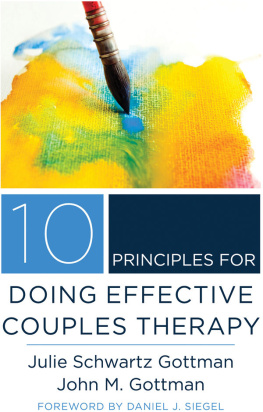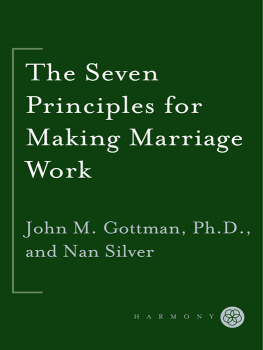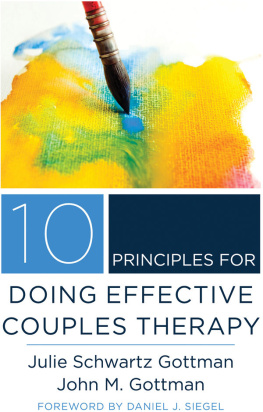Gottman John Mordechai - 10 Principles for Doing Effective Couples Therapy
Here you can read online Gottman John Mordechai - 10 Principles for Doing Effective Couples Therapy full text of the book (entire story) in english for free. Download pdf and epub, get meaning, cover and reviews about this ebook. City: New York, year: 2015, publisher: W. W. Norton & Company, genre: Home and family. Description of the work, (preface) as well as reviews are available. Best literature library LitArk.com created for fans of good reading and offers a wide selection of genres:
Romance novel
Science fiction
Adventure
Detective
Science
History
Home and family
Prose
Art
Politics
Computer
Non-fiction
Religion
Business
Children
Humor
Choose a favorite category and find really read worthwhile books. Enjoy immersion in the world of imagination, feel the emotions of the characters or learn something new for yourself, make an fascinating discovery.
- Book:10 Principles for Doing Effective Couples Therapy
- Author:
- Publisher:W. W. Norton & Company
- Genre:
- Year:2015
- City:New York
- Rating:4 / 5
- Favourites:Add to favourites
- Your mark:
- 80
- 1
- 2
- 3
- 4
- 5
10 Principles for Doing Effective Couples Therapy: summary, description and annotation
We offer to read an annotation, description, summary or preface (depends on what the author of the book "10 Principles for Doing Effective Couples Therapy" wrote himself). If you haven't found the necessary information about the book — write in the comments, we will try to find it.
10 Principles for Doing Effective Couples Therapy — read online for free the complete book (whole text) full work
Below is the text of the book, divided by pages. System saving the place of the last page read, allows you to conveniently read the book "10 Principles for Doing Effective Couples Therapy" online for free, without having to search again every time where you left off. Put a bookmark, and you can go to the page where you finished reading at any time.
Font size:
Interval:
Bookmark:
The Norton Series on Interpersonal Neurobiology
Louis Cozolino, PhD, Series Editor
Allan N. Schore, PhD, Series Editor, 20072014
Daniel J. Siegel, MD, Founding Editor
The field of mental health is in a tremendously exciting period of growth and conceptual reorganization. Independent findings from a variety of scientific endeavors are converging in an interdisciplinary view of the mind and mental well-being. An interpersonal neurobiology of human development enables us to understand that the structure and function of the mind and brain are shaped by experiences, especially those involving emotional relationships.
The Norton Series on Interpersonal Neurobiology provides cutting-edge, multidisciplinary views that further our understanding of the complex neurobiology of the human mind. By drawing on a wide range of traditionally independent fields of researchsuch as neurobiology, genetics, memory, attachment, complex systems, anthropology, and evolutionary psychologythese texts offer mental health professionals a review and synthesis of scientific findings often inaccessible to clinicians. The books advance our understanding of human experience by finding the unity of knowledge, or consilience, that emerges with the translation of findings from numerous domains of study into a common language and conceptual framework. The series integrates the best of modern science with the healing art of psychotherapy.
A Norton Professional Book

To Etana Kunovsky who brought the Gottman Institute to life.
Contents
THE FIRST PRINCIPLE
Use Research-Based Methods to Treat Couples
THE SECOND PRINCIPLE
Assess First, Then Decide on Treatment
THE THIRD PRINCIPLE
Understand Each Partners Inner World
THE FOURTH PRINCIPLE
Map Your Treatment Route
THE FIFTH PRINCIPLE
Soothe Yourself, Then Intervene
THE SIXTH PRINCIPLE
Process Past Regrettable Incidents
THE SEVENTH PRINCIPLE Replace the Four Horsemen with Gentle Conflict Management Skills
THE EIGHTH PRINCIPLE
Strengthen Friendship and Intimacy
THE NINTH PRINCIPLE
Suspend Moral Judgment When Treating Affairs
THE TENTH PRINCIPLE
Dive Deep to Create Shared Meaning
Hold the Hope
By Daniel J. Siegel
When we work as mental health professionals, we are in a wonderful and challenging position to focus fully on what both mental and health really mean, and on how to cultivate optimal well-being in others lives. With so many distinct fields contributing to this broad profession, it ought not be surprising to find that we have so many different approaches. For a young trainee or even a seasoned practitioner in the art of psychotherapy, such diversity in what comprises the field can be overwhelming, and even outright confusing. Where do you turn for sage advice? What is the basic framework from which you choose your interventions? How do you formulate your understanding of the nature of a client or patients challenges? How do you plan a treatment strategy, implement it appropriately, and assess its outcome?
For over two decades, several colleagues and I have been eager to find a common, scientifically-grounded framework for the broad field of mental health. Whatever our field of origin, from psychology and psychiatry to social work and psychiatric nursing, from educational and occupational therapy to music and dance therapy, we have the opportunity to come together to address some interrelated and fundamental questions: What is the mind? What is a healthy mind and how do we cultivate it? What can we do as mental health professionals to keep up-to-date on cutting-edge science and therapeutic approaches that inform how we approach, plan, and implement psychotherapy? Can we have a common framework that unites the field of caring for the mind that is based on weaving science with wise clinical practice?
To address these questions, the field of Interpersonal Neurobiology (IPNB) was created at the end of the last millennium. We use what E.O. Wilson (1998) would call a consilient approach, in which we seek out the foundational findings of distinct disciplinesones that do not often communicate directly with each otherand identify common themes that emerge from their independent pursuits of knowledge. These universal discoveries have special meaning for understanding reality, and for our field of mental health in that they give us unique insights into understanding the nature of life and being human. IPNB is not a form of therapy; it informs therapy. The conceptual framework that emerges from trying to understand the consilient view of the nature of our lives can be used in a range of fields, including education, child-rearing, and psychotherapy. IPNB attempts to bring science to life as it finds the consilient foundations, builds a broad interdisciplinary framework that links science and clinical work, and then applies this view to helping people live with more well-being.
10 Principles for Doing Effective Couples Therapy is a wonderful example of how to combine a range of scientific ideas and research findings and apply them for everyday use in the practice of psychotherapy. This is science-based clinical work at its best. This practical and insightful compendium by leaders in the field of relational science and its clinical application offers direct guidance on how to inform your own clinical practice. Julie Schwartz Gottman, PhD, and John M. Gottman, PhD, have been studying romantic relationships and the implementation and assessment of couples therapy for decades. And here in your hands you hold the wisdom and practical pearls of these two masters of relational health.
In this brief foreword, I will identify some initial ways in which each of these 10 principles illuminates the foundations of IPNB. Julie, John, and I have taught together, and weaving their magnificent contributions to our understanding of interpersonal connectionswhen they go well and when they fall apartwith the consilient principles of IPNB has been a fascinating, fun, and fruitful collaboration. I am honored to have their lifes work as an important part of our Norton Professional Library on IPNB that we all hope will serve as a foundational scientific core framework for the field of mental health.
The First Principle: Use Research-Based Methods to Treat Couples. While it is true that not everything that is meaningful can be measured, and not everything that can be measured is meaningful, in our field of mental health it is important to begin with a clearly thought-out, scientifically-grounded approach to the challenges we are trying to address in our work. One person in treatment is challenging enough; with two in the room with us, the complexity is both increased and made more visible.
In IPNB we say that our approach to mental health needs to be consistent with science but not constrained by it. What this means is that we draw on science as a starting place, but acknowledge that as specialists of the mind, and the mind being the source of subjective experience, we can never fully measure this core mental feature. Yet as visionary leaders in relational science, the Gottmans have beautifully shown that when couples do not focus on the internal subjective experience of each member of the pair, the health of the relationship suffers. As you read about their research findings, you may find support for what you may have felt intuitively: Healthy relationships require that we honor and support one anothers differentiated experiences. In many ways, this scientific finding is consistent with one major principle of IPNB: Health emerges from integration. Integration is the differentiation and linkage of different elements in a system. Integration in a relationship entails the honoring of differences and the compassionate communication that links two individuals together as a whole. Integration is the source of the notion that the whole is greater than the sum of its parts and this is exactly what the Gottmans research findings reveal.
Next pageFont size:
Interval:
Bookmark:
Similar books «10 Principles for Doing Effective Couples Therapy»
Look at similar books to 10 Principles for Doing Effective Couples Therapy. We have selected literature similar in name and meaning in the hope of providing readers with more options to find new, interesting, not yet read works.
Discussion, reviews of the book 10 Principles for Doing Effective Couples Therapy and just readers' own opinions. Leave your comments, write what you think about the work, its meaning or the main characters. Specify what exactly you liked and what you didn't like, and why you think so.











